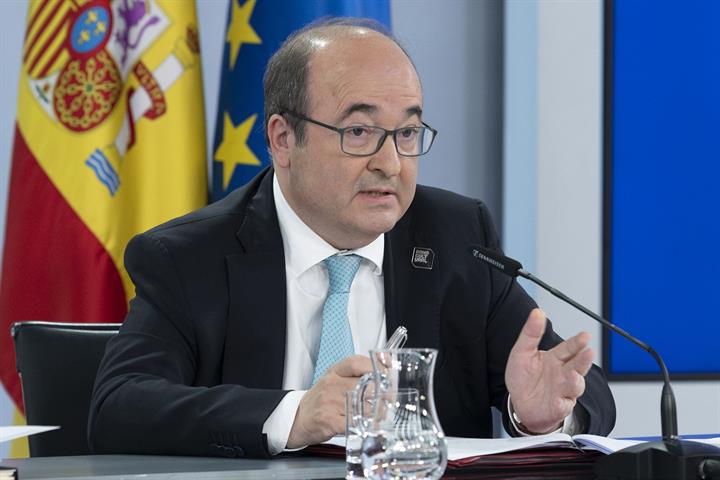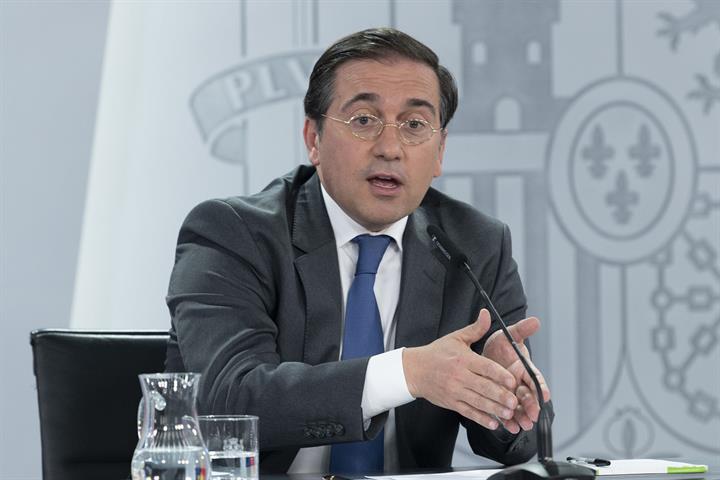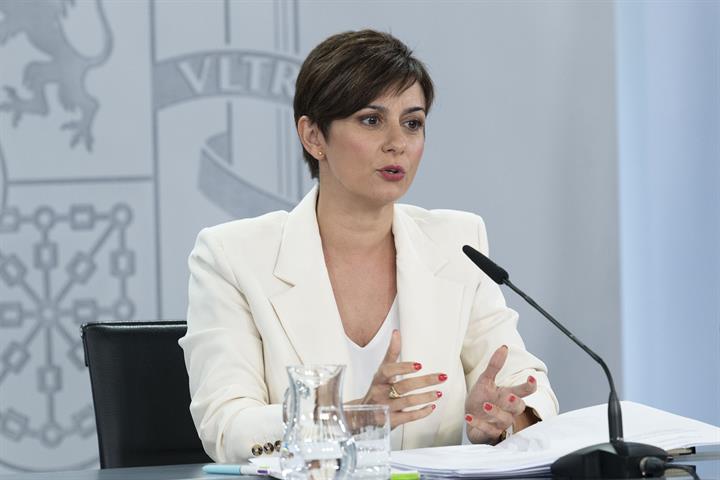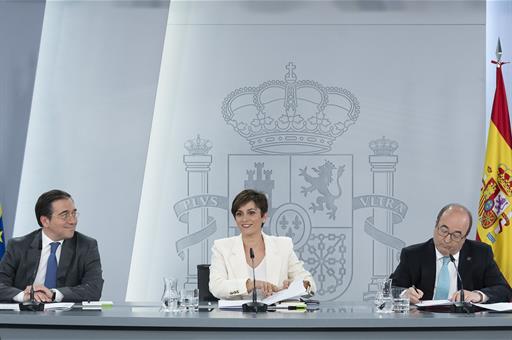Council of Ministers
The Council of Ministers approves measures to facilitate access to culture and to encourage cinema-going
Council of Ministers - 2023.6.13
Moncloa Palace, Madrid
The Minister for Culture, Miquel Iceta, has explained that the Council of Ministers has regulated direct subsidies to cinemas to encourage people over the age of 65 to return after the pandemic.
Miquel Iceta recalled that on 16 May, the Government commissioned his department to to define a cinema access programme, which has already been drawn up in collaboration with the main associations of the film exhibition and distribution sectors.
The programme will have a budget of 10 million euros from the 2023 State Budget and will allow the over-65s to watch a film for two euros one day a week until the end of the year.
Iceta stressed that the initiative aims to boost the cultural sector - particularly cinemas - which is taking the longest to recover from the effects of the pandemic, and will benefit more than nine and a half million people. "If 49% of 20-24 year-olds have been to the cinema at least once a year between 2021 and 2022, that percentage drops to 6% for the older population", he stated.
The minister said that, from the entry into force of the measure, one day after its publication in the Official State Gazette, the cinemas interested in participating will have seven working days to submit their application, so that "in July, senior citizens and cinemas themselves will be able to benefit".
"We want more cinemas to open, rather than watch helplessly as they close. We want to encourage Spaniards to go to the cinema, hence this senior cinema initiative", added the minister.
The measure is aligned with the objectives of component 24 of the Recovery, Transformation and Resilience Plan, which aims to facilitate access to culture and foster the transition to the new digital environment, as well as with the United Nations Sustainable Development Goals, which recognise the safeguarding and promotion of culture as an end goal.
Promotion of feature films
 Pool Moncloa/Borja Puig de la Bellacasa
Pool Moncloa/Borja Puig de la Bellacasa
The Minister for Culture emphasised that Spanish cinema is witnessing a great time, largely due to the drive of women filmmakers, who have placed Spain in the international spotlight.
In relation to this sector, Miquel Iceta also announced that the Government has authorised the Instituto de la Cinematografía y de las Artes Visuales to announce the general aid for the production of feature-length films for 2023, for an estimated amount of 62 million euros, 10.71% more than last year.
The specific aim of this open call for applications is to improve the industrial fabric of the film industries, enabling them to be strengthened and facilitating the development of their activity in an open and competitive market.
Iceta also stressed that the grants, which are in line with two of the axes of the recovery plan: digitalisation and the reduction of the gender gap, earmark a minimum of 35% for projects made exclusively by female directors and a minimum of 10% for animation projects.
Applying for the Youth Cultural Voucher
During his speech at the press conference that followed, the minister reminded the audience that young people who will turn 18 in 2023 can apply for the new cultural voucher from today until 30 September through the website set up for this purpose.
Iceta explained that the second edition of the call has incorporated new methods of identification to facilitate the application process. Young people, he explained, "will have 400 euros at their disposal to enjoy culture for a year and discover new experiences, such as going to the opera or ballet for the first time, to a concert, to a festival, to see a play, a video game, the best cinema, the best podcasts or to read that book they wanted, that comic, or to subscribe to a magazine or newspaper".
Spanish Presidency of the Council of the EU
The Minister for Foreign Affairs, European Union and Cooperation, José Manuel Albares, presented the Council of Ministers with the report on the preparation of the Spanish Presidency of the Council of the European Union, which begins on 1 July. Albares pointed out the importance of the event "for any member state of the European Union: the previous one took place thirteen years ago and it will be at least another thirteen years before Spain holds the Presidency of the Council again".
 Pool Moncloa/Borja Puig de la Bellacasa
Pool Moncloa/Borja Puig de la Bellacasa
The minister stressed that the organising committee, which includes all the ministries, has been working since February 2022, and that the Government has designed the Presidency "as a real national project" in which it has involved all regional governments. The Executive has also benefited from the contributions of the Spanish parliamentary forces and MEPs who wished to collaborate. A civil society forum and a group of experts will also contribute ideas and opinions.
Relevant milestones and priorities
José Manuel Albares pointed out three important dates for the start of the Spanish Presidency: on 15 June the President of the Government of Spain, Pedro Sánchez, will detail the priorities and various practical aspects; on 3 July the College of Commissioners will come to Madrid, and on 4 July the formal inauguration will take place in Brussels.
Among the major issues that will be at the centre of Spain's six-month term, the Foreign Affairs Minister referred first to Ukraine: "Let peace return to Ukraine as soon as possible, deal with the economic and social consequences of Russia's illegal and brutal aggression against Ukraine, and everything related to the negotiations for Ukraine and other countries that are included in the enlargement of the European Union to join".
A second pillar of the Spanish Presidency will be everything to do with citizens and business. Among the priority legislative dossiers, Albares mentioned energy security and green transition, electricity market reform, competitiveness, economic governance rules and 'NextGenerationEU' funds, linked to the "implementation of specific European economic policies".
The minister stressed that "social Europe is also going to be at the forefront", which will take the form of initiatives such as the European dependency card, mental health and the Migration and Asylum Pact.
Bringing Latin America closer together and keeping Europe united
Among the "very symbolic moments" of the Presidency, José Manuel Albares has included the EU-Latin America Summit, where "we will make an effort to ensure that Latin America is and remains forever at the heart and centre of European policies".
Other important events will be the Granada European Council on 6 October - which will be preceded by a meeting of the European Political Community - and the 22 thematic European councils "which, as agreed with all the regional governments, will travel throughout Spain so that the Presidency can be what the Government wants, a project for the country, so that Spain is closer to Europe and so that Spaniards know Europe even better". In addition, numerous high-level events will be held, such as the EU-Western Balkans Summit and the Union for the Mediterranean Summit.
"The Spanish Presidency of the Council of the European Union will demonstrate and show Spanish leadership", said Albares, who argued that this leadership will serve to "keep Europe united" and move it forwards in what is "probably the most complex and convulsive moment for the continent since the fall of the Berlin Wall".
More companies benefiting from the Statute for Electro-intensive Consumers
 Pool Moncloa/Borja Puig de la Bellacasa
Pool Moncloa/Borja Puig de la Bellacasa
The Government has amended the Statute for Electro-intensive Consumers to increase the number of companies that can benefit from this designation from the current 612 to 1,180. The Statute protects those industrial companies most affected by the cost of electricity.
The Minister for Territorial Policy and Government Spokesperson, Isabel Rodríguez, explained that the amendment broadens the catalogue of economic branches that can benefit, especially in the area of extractive industries and manufacturing sectors.
Greater stability of regulated electricity tariffs
The Executive has also amended the methodology for calculating the Voluntary Price for the Small Consumer (PVPC), the regulated electricity tariff, to which some nine million consumers are part.
Isabel Rodríguez assured that with the new method, bills will be more stable, as they will be less exposed to periods of volatility "such as those we have witnessed in recent months". The formula will start to be applied from 1 January 2024 to give retailers time to adapt, and consumers will not have to do anything.
Modernisation of railway infrastructure
The Council of Ministers has authorised several railway infrastructure investments.
The largest allocation, 500 million euros, is for the construction of the new station at Madrid-Puerta de Atocha Almudena Grandes. This underground station will link up with the high-speed tunnel between Puerta de Atocha and Chamartín-Clara Campoamor, allowing high-speed trains to stop at both stations.
The Executive's spokesperson also highlighted the investment of 400 million euros for the railway integration in Lorca and the new Sutullena station, the last section of the Murcia-Almería High-Speed Line; 15 million euros for the new Parla Norte station (Madrid), and 14 million for the modernisation of more than 1,000 level crossings.
Non official translation





